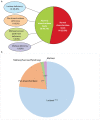Intestinal Disaccharidase Deficiency in Adults: Evaluation and Treatment
- PMID: 37199899
- PMCID: PMC10226910
- DOI: 10.1007/s11894-023-00870-z
Intestinal Disaccharidase Deficiency in Adults: Evaluation and Treatment
Abstract
Purpose of review: Disaccharidase deficiency in adults causes carbohydrate malabsorption, resulting in symptoms which significantly overlap with irritable bowel syndrome (IBS). This article discusses the diagnosis and treatment of disaccharidase deficiency within the context of recent literature.
Recent findings: Disaccharidase deficiency in adults is more common than previously thought, which includes lactase, sucrase, maltase and isomaltase enzymes. Deficiency in disaccharidases, which are produced by the intestinal brush border, will interfere with the breakdown and absorption of carbohydrates and may result in abdominal pain, gas, bloating and diarrhea. Patients deficient in all 4 disaccharidases are known as having "pan-disaccharidase" deficiency, which has a distinct phenotype with more reported weight loss than patients deficient in one enzyme. IBS patients who do not respond to low FODMAP dietary restriction may have undiagnosed disaccharidase deficiency and may benefit from testing. Diagnostic testing methods are limited to duodenal biopsies, which is the gold standard, and breath testing. Dietary restriction and enzyme replacement therapy have been shown to be effective treatments in these patients. Disaccharidase deficiency is an underdiagnosed condition in adults with chronic GI symptoms. Patients who do not respond to traditional treatment strategies for DBGI may benefit from testing for disaccharidase deficiency. Further studies delineating the distinctions between disaccharidase deficient patients and those with other motility disorders are needed.
Keywords: Carbohydrate malabsorption; Disaccharidase; Sucrase Isomaltase Deficiency.
© 2023. This is a U.S. Government work and not under copyright protection in the US; foreign copyright protection may apply.
Figures




References
-
- Russo P, Ruchelle ED, Piccoli DA. Pathophysiology of pediatric gastrointestinal and liver disease. 2. New York, NY: Springer; 2014. pp. 19–54.
-
- US Department of Agriculture and US Department of Health and Human Services. Dietary guidelines for Americans. 7th ed. Washington, DC:US Government Printing Office 20011.
-
- Choi YK, Kraft N, Zimmerman B, Jackson M, Rao SS. Fructose intolerance in IBS and utility of fructose-restricted diet.J Clin Gastroenterol20008;42:233–238. - PubMed
Publication types
MeSH terms
Substances
LinkOut - more resources
Full Text Sources
Medical
Research Materials

